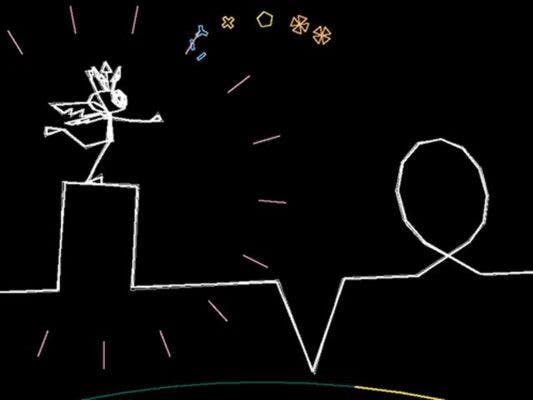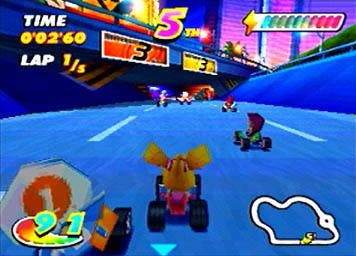Investigating the PSP's PSone emulator
As Sony laments another security breach.
When the Sony PSP launched in Japan at the tail end of 2004, it looked set to dominate handheld gaming for the foreseeable future. The machine had it all: ultra-desirability, state-of-the-art specs, all-encompassing support from all major publishers, plus every major Sony and third party gaming franchise on the way. But a combination of shovelware PS2 ports, a basic lack of understanding as to what is required from a handheld game experience and a high price point has held the machine back dramatically. At the same time, Nintendo's DS has caught the imagination in a way that Sony seems unable to match.
With the PSP more than a little moribund, Sony has plunged an adrenalin-packed syringe of extra functionality directly into the heart of the machine, injecting new features deep into its advanced innards. Most exciting of these new upgrades is the PlayStation 1 emulator. A core component of the PS3-interfacing firmware 3.0, it is one of the most ambitious and complex pieces of code yet devised for the PSP. Original PlayStation titles can be bought and downloaded from the PlayStation Store via PS3, downloaded to memory stick then played on the handheld. And the emulation performance is astonishingly good, as close to perfect as you could want, with only minor glitches being reported on a minority of titles.
A software design classic
While many were expecting the PS1 titles available on the Store to be ported to the PSP with modifications, the downloaded code is actually 100% identical to the titles that were released on CD all those years go, with the PSP itself completely emulating the base hardware. Potential problems such as the lack of all of the original joypad functions are all addressed internally by the emulator, which offers several button remapping options. Most PS1 titles run at a humble 256x224 resolution and the emulator can match that, but additionally offers options to scale up the image 18% to fill the screen at the original aspect ratio, or else stretch the image to fill the PSP's 480x272 widescreen display.

The coding is pretty much a work of genius - there's strong evidence that the PSP's MIPS R4000-based CPU is running most of the PS1's R3000 code natively, but it's highly likely that the rest of the PS1 hardware is being emulated entirely by software. Some of the compatibility glitches with certain titles look very similar to those witnessed in the aged Macintosh Connectix Virtual Game Station emulator, released back in 1999. This codebase was bought by Sony (mostly to get it off the shelves) but it may well be that elements of that product have found their way into the PSP code. What is for certain is that this is the most demanding PSP code ever written. All games released to date run with the CPU locked at 222MHz, but the emulator dynamically changes the CPU speed to cope with the load and it is the only piece of software ever to run the PSP CPU at its top speed of 333MHz when performing really complex tasks.
What this essentially means is that the PSP - unofficially, for now - has access to a colossal library of brilliant games, making the handheld an essential buy. Final Fantasies VII-IX, Metal Gear Solid, Vagrant Story, Gran Turismo 1 and 2, Tekken 3, Xenogears, Resident Evil, Castlevania: Symphony of the Night... the list of gaming titans potentially available for handheld play is beyond sensational. The only issues are that - officially at least - you can only play these titles if they're available to buy in the PlayStation Store, and if you own a PS3, required to access the Store in the first place.
Of course, there's also the factor of money. Each game costs US$ 5.99 to download, which would be fair enough were it not for the fact that you might already have bought the original PS1 title. It could be argued that effectively charging for this service is good business sense from Sony, and earning additional revenue from back catalogue content is something the movie and music industries have been doing for decades. On the other hand, spending so much time and effort on such a monumental piece of code and then basically hobbling its potential is a little puzzling when the PSP really needs all the help it can get in improving its fortunes. Over and above the money issue, the PS3 ownership prerequisite in particular is another extremely bizarre limitation considering how low the crossover in ownership must be.
Emulator exploitation

Unfortunately for Sony, Christmas was hardly a season of good tidings. The PSP's security, now completely compromised, makes the reverse-engineering of any internal software module very easy for those programmers in the know. Spanish PSP code warrior, Dark Alex, having already released his own piracy-friendly firmware update, released a completely open PlayStation emulator update on Christmas Day, which offers extreme levels of compatibility with well over 90% of all NTSC PlayStation titles. Over and above the work done on defeating the PSP's internal security, the hack works simply by bypassing a security checksum and diverting a license key check. Also released was a tool that allows you to copy your own PlayStation titles into PSP friendly memory stick files for playback on the emulator.
Not surprisingly, even those with zero interest in piracy want in on the action here. Despite many PS1 titles obviously showing their age 12 years after the system's debut, there are so many solid gold gaming experiences to be savoured on the PSP that Dark Alex's custom firmware build is now a supremely hot download. Hardcore gamers, having turned their back on the Sony handheld, are now coming back in their droves, digging out their dormant PS1 collections and replaying some classic slices of videogaming history, or even chasing down games they might have missed in the past in order to play them for the first time on the PSP.
How Sony chose to respond to this Yuletide guerrilla assault on their PS1 back catalogue plans turned out to be pretty predictable. The latest firmware 3.10 featured new PlayStation emulator code, a couple of security patches and a new set of encryption keys (which were broken before the US version of the firmware was even released). But perhaps someone at Sony is witnessing the wave of good will and excitement surrounding PS1 emulation and you have to wonder - would it hurt their plans so much to sell their own PS1 CD conversion tool supported by their own official firmware?
